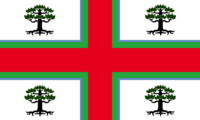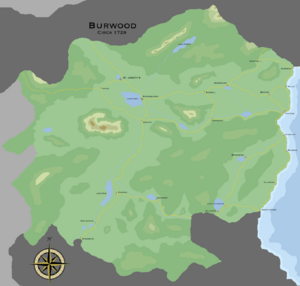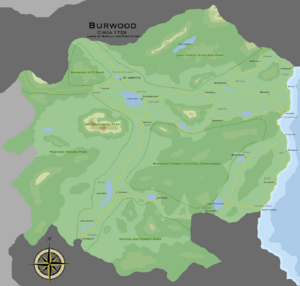Burwood: Difference between revisions
(Created page with "{{subdivision | image_flag = | subdivision = Burwood | status = Council | capital = St. Joseph's | population = 441,302 | largecity = St. Joseph's | title = Exarch | leader = Bernard MacGrath | government = Witan | language = East Moorlandic | religion = ''Church of the Holy Lance'' | }} '''Burwood''' is a council territory of the Kingdom of Moorland. The region is the encompasses the majority of the old Ostland. It was created following the Burwood Wildfi...") |
No edit summary |
||
| (9 intermediate revisions by the same user not shown) | |||
| Line 1: | Line 1: | ||
{{subdivision | | {{subdivision | | ||
image_flag = | | image_flag = Burwood flag.png | | ||
subdivision = Burwood | | subdivision = Burwood | | ||
status = Council | | status = Council | | ||
| Line 13: | Line 13: | ||
}} | }} | ||
'''Burwood''' is a council territory of the [[Kingdom of Moorland]]. The region is the encompasses the majority of | '''Burwood''' is a council territory of the [[Kingdom of Moorland]]. The region is the encompasses the majority of old [[Ostland]]. It was created following the [[Burwood Wildfires]], which gutted most of the region's population and destroyed thousands of acres in [[Burwood Forest]]. The capital is St. Joseph's, a small city that was rebuilt following the destruction of Reichsborg a short distance to the east. The [[Burwood Restoration Initiative]] is a government-funded project to rebuild the region following the fires. | ||
== History == | |||
The region of Burwood was originally established by [[Nova England]] around 1500 AN, who began to rapidly colonize the area. But by 1551 the Nova English had been pushed back by hostile tribes towards their cores lands in the north. Eventually Burwood would be occupied by [[Sirocco]], and later on Ergonia. Although Nova England would resurface again, they would never reassert control over Burwood before their eventual collapse. The arrival of [[Norse]] settlers from the east around 1700 caused a series of conflicts with the long-established locals, as the emergent state of [[Ostland]] began to forcibly convert the population to their culture. Lacking the firepower to resist, the locals were subjugated as Ostland's power radiated from Reichsborg to the shores. Ostland's colonialist policies would come to a halt with the start of the [[Burwood Wildfires]]. As Ostland collapsed, Moorland assumed authority over the region and restored the Council of Burwood. Reversing years of Norse colonialism, a new government was formed encompassing elements of the remaining Ostlandic people and the Nova English population. While a new capital was established as St. Joseph's, the gutted ruins of Reichsborg were slowly being rebuilt as the city of Kingsburgh. | |||
== Geography == | |||
The territory of Burwood is mostly rural woodland. It is punctuated by several large highland areas that are covered in evergreen forests, mostly Moors Pine. Four large lochs feed freshwater rivers, and it is along these and the coastline where most of the population is concentrated. Loch Eve is home to the infamous [[Loch ell]] Monster, a reptilian creature from prehistoric times that was presumed to be mythical until more recent scientific research proved its existence. Despite finding that a small population of the creatures exist outside the area, the myth of the monster still brings tourists to the region annually. | |||
[[File:Burwood-map.png|left|thumb|Map of Burwood, circa 1729]] | |||
== Government and Politics == | |||
[[File:Burwood-nobles-map.png|left|thumb|Burwood Seats of Nobility]] | |||
Following the [[Burwood Wildfires]], Moorland filled the vacuum left behind by the collapse of Ostland's government. While the destruction of Reichsborg and other major cities erased much of the Elder Nobility, it did not result in a complete elimination of noble peerage and lands within the region. Moorland was quick to adopt a new legislative body for Burwood that incorporated much of the old nobility, called the Folksthing. This legislature followed the same guidelines as other council governments, but guaranteed seats for the old Ostlandic nobility. This helped to quell unrest with the change in regimes and assure a smooth transition to the new monarchy. Unlike the previous system with three separate legislative bodies, which was held to be bloated and archaic, the Folksthing includes all landed nobles and common representatives. The titles and lands were retained by the lesser nobility of Ostland, while those lands and titles held by the Elder Nobility were disbanded and distributed among the lesser, or incorporated into the lands of some of the free cities. The use of [[Ehre (Ostland)|Ehre]] as a tribute to the King was replaced by standardized taxation like the rest of the kingdom. | |||
=== Seats of Nobility === | |||
{| class="wikitable" | |||
! Seat !! Name | |||
|- | |||
| [[St Joseph's]] || Free City of St Joseph's | |||
|- | |||
| [[Eisenwald Castle|Eisenwald]] || Eisenwald Castle (to [[Hurmu]]) | |||
|- | |||
| Avens || County of Avenshire | |||
|- | |||
| [[Reichsborg|Kingsburgh]] || Barony of Silverwood | |||
|- | |||
| Evesden || Altgravate of Glen Eve | |||
|- | |||
| Stonegate || County of Stonington | |||
|- | |||
| Ostkirk || Lordship of the Ost | |||
|- | |||
| Urdvegan || Earldom of Great Urd | |||
|- | |||
| Norsewood || County of Westwood | |||
|- | |||
| Overton || Margravate of Overmoor | |||
|- | |||
| Wells || Landgravate of Caeldoc | |||
|- | |||
| Portree || Free City of Portree | |||
|- | |||
| Wickham || County of Wick | |||
|- | |||
| Brewers || Burgravate of Brewers | |||
|- | |||
| Ellsmere || County of the Ell | |||
|- | |||
| North Haven || Free Port of Haven | |||
|- | |||
| Kilmister || Barony of Kilmister | |||
|} | |||
[[Category:Moorland]] | [[Category:Moorland]] | ||
Latest revision as of 14:17, 26 November 2024
| Burwood | |
| Subdivision type: | Council |
| Capital: | St. Joseph's |
| Population: | 441,302 |
| Largest Cities: | St. Joseph's |
|
| |
| Local Leadership Title: | Exarch |
| Local Government: | Witan |
| Current leader: | Bernard MacGrath |
|
| |
| Local language: | East Moorlandic |
| Local Religion: | Church of the Holy Lance |
Burwood is a council territory of the Kingdom of Moorland. The region is the encompasses the majority of old Ostland. It was created following the Burwood Wildfires, which gutted most of the region's population and destroyed thousands of acres in Burwood Forest. The capital is St. Joseph's, a small city that was rebuilt following the destruction of Reichsborg a short distance to the east. The Burwood Restoration Initiative is a government-funded project to rebuild the region following the fires.
History
The region of Burwood was originally established by Nova England around 1500 AN, who began to rapidly colonize the area. But by 1551 the Nova English had been pushed back by hostile tribes towards their cores lands in the north. Eventually Burwood would be occupied by Sirocco, and later on Ergonia. Although Nova England would resurface again, they would never reassert control over Burwood before their eventual collapse. The arrival of Norse settlers from the east around 1700 caused a series of conflicts with the long-established locals, as the emergent state of Ostland began to forcibly convert the population to their culture. Lacking the firepower to resist, the locals were subjugated as Ostland's power radiated from Reichsborg to the shores. Ostland's colonialist policies would come to a halt with the start of the Burwood Wildfires. As Ostland collapsed, Moorland assumed authority over the region and restored the Council of Burwood. Reversing years of Norse colonialism, a new government was formed encompassing elements of the remaining Ostlandic people and the Nova English population. While a new capital was established as St. Joseph's, the gutted ruins of Reichsborg were slowly being rebuilt as the city of Kingsburgh.
Geography
The territory of Burwood is mostly rural woodland. It is punctuated by several large highland areas that are covered in evergreen forests, mostly Moors Pine. Four large lochs feed freshwater rivers, and it is along these and the coastline where most of the population is concentrated. Loch Eve is home to the infamous Loch ell Monster, a reptilian creature from prehistoric times that was presumed to be mythical until more recent scientific research proved its existence. Despite finding that a small population of the creatures exist outside the area, the myth of the monster still brings tourists to the region annually.
Government and Politics
Following the Burwood Wildfires, Moorland filled the vacuum left behind by the collapse of Ostland's government. While the destruction of Reichsborg and other major cities erased much of the Elder Nobility, it did not result in a complete elimination of noble peerage and lands within the region. Moorland was quick to adopt a new legislative body for Burwood that incorporated much of the old nobility, called the Folksthing. This legislature followed the same guidelines as other council governments, but guaranteed seats for the old Ostlandic nobility. This helped to quell unrest with the change in regimes and assure a smooth transition to the new monarchy. Unlike the previous system with three separate legislative bodies, which was held to be bloated and archaic, the Folksthing includes all landed nobles and common representatives. The titles and lands were retained by the lesser nobility of Ostland, while those lands and titles held by the Elder Nobility were disbanded and distributed among the lesser, or incorporated into the lands of some of the free cities. The use of Ehre as a tribute to the King was replaced by standardized taxation like the rest of the kingdom.
Seats of Nobility
| Seat | Name |
|---|---|
| St Joseph's | Free City of St Joseph's |
| Eisenwald | Eisenwald Castle (to Hurmu) |
| Avens | County of Avenshire |
| Kingsburgh | Barony of Silverwood |
| Evesden | Altgravate of Glen Eve |
| Stonegate | County of Stonington |
| Ostkirk | Lordship of the Ost |
| Urdvegan | Earldom of Great Urd |
| Norsewood | County of Westwood |
| Overton | Margravate of Overmoor |
| Wells | Landgravate of Caeldoc |
| Portree | Free City of Portree |
| Wickham | County of Wick |
| Brewers | Burgravate of Brewers |
| Ellsmere | County of the Ell |
| North Haven | Free Port of Haven |
| Kilmister | Barony of Kilmister |


